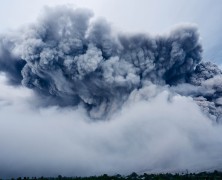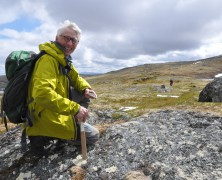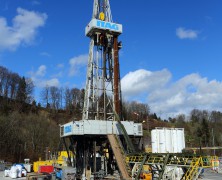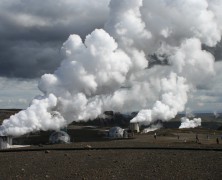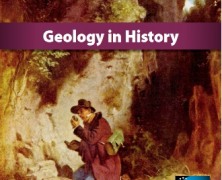The 1815 eruption at Mount Tambora is widely considered the most damaging in human history. It led to global extreme weather change. The harvests failed and 1816 is remembered in Europe as the year without a summer. (https://en.wikipedia.org/wiki/1815_eruption_of_Mount_Tambora) Europe had seen failing harvests since 1812. The extreme summer of 1816 forced people to eat their remaining cattle and horses, famine occurred. The German inventor Karl Drais started to develop a machine that could replace the horse for transportation. In 1817 he introduced “Die Laufmaschine” (Veliocipede). On June 12th 1817 Drais made the first bicycle ride in history, form Mannheim to the Coaching Inn “Schwetzinger Relaishaus”, a distance of 5 miles (8km) (https://en.wikipedia.org/wiki/Karl_Drais) The Geological Survey of Norway will try to initiate an event on June 12th 2017 to mark this 200 years jubilee: The volcano that gave us the bicycle! [Source: NGU – Geological Survey of...
The oldest traces of life on Earth
posted by EuroGeoSurveys
The oldest traces of life on Earth An international team, with the researchers Tor Grenne at the Geological Survey of Norway and John F. Slack from USGS on board, has recently found relics on the world’s oldest known life. These are traces of microscopic organisms that lived at hot springs down on the seabed more than 3770 million years ago. Possibly they can be as old as 4280 million years. By comparison, the age of the earth is around 4600 million years old, and the oldest traces of life on land about 460 million years. The primitive organisms themselves are not preserved, but they can be traced through thin threads and pipe-like structures in fine-grained iron minerals in the rock. The tiny structures have characteristic shapes and branches that correspond to what we find around metal-rich hot springs on long-term dispersal backs on the seabed today. Here, very special bacteria live by oxidizing iron and turning it into rust, a kind of iron oxide that eventually transforms into hematite. The researchers have emphasized systematically to investigate whether the findings may stem from non-biological processes, such as temperature and pressure changes in the rocks after they were deposited. The conclusion is that the structures must originate from microorganisms. Another indication is that along with particular structures are graphite, apatite and carbonate, which are typical of converted biological material, as well as instances of small round structures, so-called rosettes and granules, which are formed during the degradation of bacterial residues on the seabed. These are identical to discoveries in younger rocks through much of the geological history of the Earth, including rocks the researchers have studied in North America, Western Australia and Norway. At Løkken in Central Norway there are microscopic wire-shaped traces of bacteria that...
No technological ban of hydraulic fracturing in Switzerland
posted by EuroGeoSurveys
PRESS RELEASE Bern, 3 March 2017 – the Federal Council (the 7-member government of Switzerland) stated its position on the use of the subsurface by hydraulic fracturing (fracking). The application of the technology should in general be possible under certain conditions, in particular when associated with drillings to extract geothermal heat from great depths. However, the Federal Council does not support the development of natural gas reserves by hydraulic fracturing due to Switzerland’s climate policy. At the same time, the Federal Council sees no reason for a moratorium. Swisstopo, Switzerland’s geological survey, will follow the acquisition and valorisation of these geological underground data. The link to this press release is (French, Italian and German):...
Good legal framework for deep geothermal energy in Switzerland
posted by EuroGeoSurveys
PRESS RELEASE Bern, 3 March 2017 – the Federal Council (the 7-member government of Switzerland) has approved the report «Conceptual development and implementation of policies in support of the utilisation of (deep) geothermal resources in Switzerland». The report essentially shows that geothermal energy can make an important contribution to the security of energy supply in Switzerland. The first set of measures related to Switzerland’s energy strategy 2050, approved by Parliament on 30 September 2016, encompasses policies that will better enable the realisation of the potential by way of technology development, research and innovation. Swisstopo, Switzerland’s geological survey, will play a fundamental role in collected data from the recipients of financial contributions for exploration, storage and make them public available. The next 21 May 2017 the Swiss are called to vote. The link to this press release is (French, Italian and German):...
GEOLOGY IN HISTORY
posted by EuroGeoSurveys
PRESS RELEASE “GEOLOGY IN HISTORY” The geologist: an unknown actor in many historical events The latest EuroGeoSurveys publication “Geology in History” will be launched on 28th March 2017 at the OREGA Brussels Leopold, during the EuroGeoSurveys 42nd General Meeting by Mr. Patrick McKeever, Secretary of the International Geoscience Porgramne at UNESCO, Mr. Gwen Cozigou, Director of the European Commission’s DG for Internal market, Industry, Entrepreneurship and SMEs, and Ms. Charlina Vitcheva, Deputy Director General of the European Commission’s DG Joint Research Centre. The book describes a surprising and unusual combination that brings you to understand how the geological discoveries have marked history and determined the shape of our society, of our culture and of our habits. The European Geological Surveys are pleased to present some examples highlighting the links between History and geology. Most of them are related to mineral resources which constitute the basement of the development of mankind. In some cases, geology has been at the heart of numerous battles, such as in Italy, where a volcanic island was fought over among three different empires: the British, French and Italians who have tried to obtain its ownership but a geological process quickly solved the political problem; Ferdinandea was eroded by the sea and disappeared. The geology has marked a new turn during the First World War. In the face of new and incredible firepower, many front lines are frozen and it is then necessary to use underground space, requiring geological knowledge. Water was required in considerable volume to supply troops. Armies also had to protect their own side and attack the enemy from the ground. Warring parties also needed mineral resources to sustain the war industry, mainly coal and iron, but also a large amount of metals: nickel, aluminium, copper. To find...

